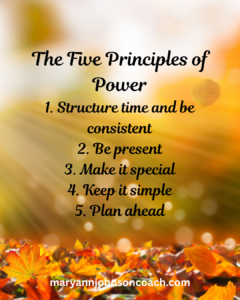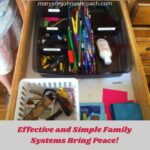 Today, let’s look at the fifth Principle of Power. I love all five principles; they all matter, but this seems to be the most challenging to implement. Many of us fly by the seat of our pants. Don and I did that in our marriage and family life for many years, and we paid a price; our family paid a price. Things go better, even if they don’t go exactly as we envisioned, when we have a plan. This is true in our goals, family discipline, maintaining loving relationships, having workable family systems, engaging in family activities, managing school, meals, chores, and so forth.
Today, let’s look at the fifth Principle of Power. I love all five principles; they all matter, but this seems to be the most challenging to implement. Many of us fly by the seat of our pants. Don and I did that in our marriage and family life for many years, and we paid a price; our family paid a price. Things go better, even if they don’t go exactly as we envisioned, when we have a plan. This is true in our goals, family discipline, maintaining loving relationships, having workable family systems, engaging in family activities, managing school, meals, chores, and so forth.
Principle 5
Plan ahead. Taking time to think about your family, your children’s needs, your personal goals, and all the things I listed above is one of the keys to success. It doesn’t take hours. What it takes is thinking and pondering regularly, making decisions, and then following through. If you’re thinking about a road trip, vacation, or a career, then planning is an obvious necessity. However, this applies just as well in our families. Whenever we engage as a family, it requires some planning. The principle of regular planning helps families manage better.
Part of planning is observing how your family operates. What interests your kids? What holidays are coming up? How’s school going, whether you use the public or private system, or homeschool? What’s happening in the world, and how is it impacting your family? As we think and observe, we come up with ideas on how to engage with our family. Then we plan, so we have success.
Try this:
Have a thirty-minute brainstorming session with your husband once a week or even once a month. What do you want your children to be exposed to, to know about? What have you heard them talk about in the last week, or what have they seemed to enjoy or struggle with? How are you doing with your current plan of discipline? What’s coming up that you might want your family to participate in? As you focus on watching and thinking, ideas will come about ways you can help your children manage what’s happening around them and ways your family can learn together, work together, and enjoy being together.
Another idea:
Have a weekly family council. See what your kids are worried about or interested in. What ideas do they have? What plans would they like to see developed in your family? What’s working in your home systems and what isn’t? How can that be adjusted?
Can a Simple Family Activity Trump Disneyland?
I worked with families daily for over a decade. I talked to children and their parents. I learned from these interactions that structured time, consistency, simplicity, planning, and parents remaining present make everything more special. This specialness trumps whatever the activity is.
When I was writing my book Becoming a Present Parent, I asked my children, their spouses, and some of their friends what the most meaningful things were they did in their family when they were growing up; what captured their hearts and remained with them into adulthood. I discovered that when we observe these five principles, even the most ordinary events become special. A daily family walk, playing together on the beach, or a camping trip can be as meaningful as a trip to Disneyland. What? You don’t believe me, do you? Check out the note I received from my daughter-in-law.
Kendra said, “Another thing I’ll always cherish from my childhood was the time my parents spent with me outdoors, going to the beach, hiking, fishing, swimming, and letting me be a kid. It was something we often did because it didn’t cost much, but to me it was the greatest thing ever. In fact, one time my dad took me to Disneyland, and I asked him if we could leave and go to the beach. I look back on that now and think that must have both surprised him and probably made him wish he had saved all that money. I’m so grateful my parents taught me to cherish experiences and nature over money and things.”
Kendra’s parents thought about what they wanted for their family. They planned how they could afford time together and how to make it happen consistently. They set aside time and kept their activities simple. They were present during these activities. Wise planning made the activity happen, and their children feel special!
These five principles are non-negotiable if you want consistent success in your family work and activities. In my experience, with all types of children and families, when you plan for what you want, structure time together, keep your plan simple and consistent, make the ordinary special, and remain emotionally and mentally present, you will be successful every time, even if all doesn’t go as planned.






